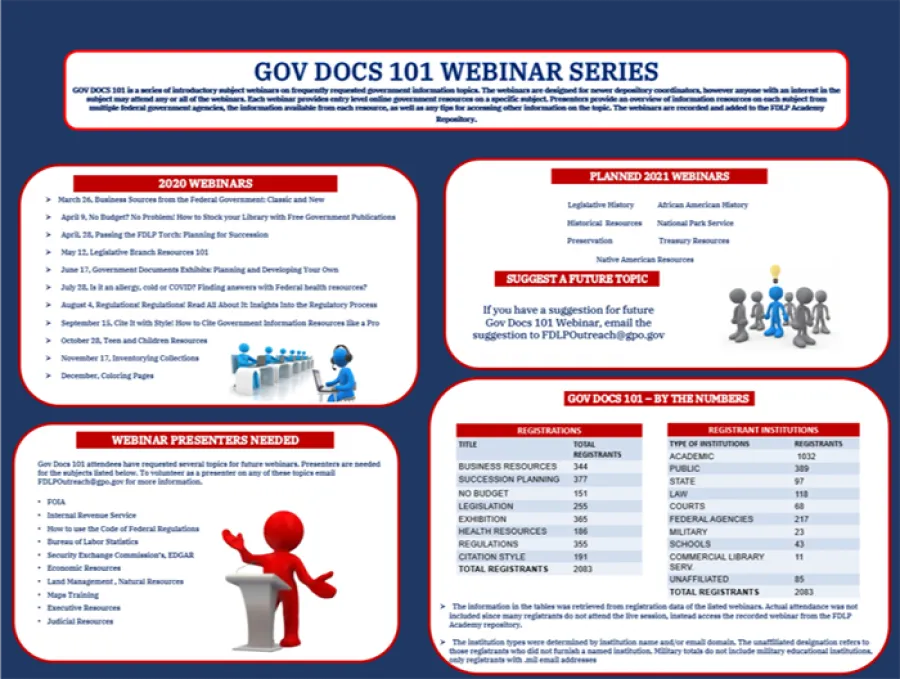
Gov Docs 101 Webinar Series Overview
Kathy Carmichael, Government Publishing Office, Federal Depository Support Services, Outreach Librarian, [email protected]
Gov Docs 101 is a new FDLP Academy ongoing webinar series, introduced in early 2020. The series provides topics targeted to newer Federal Depository coordinators, but is open to anyone interested in the topic. Since its beginning in February the webinars have been well attended and have attracted attendees from a wide variety of institutions and libraries. The poster will review the series' first year, first year metrics, and provide information about plans for 2021.
Download a PDF of the poster.
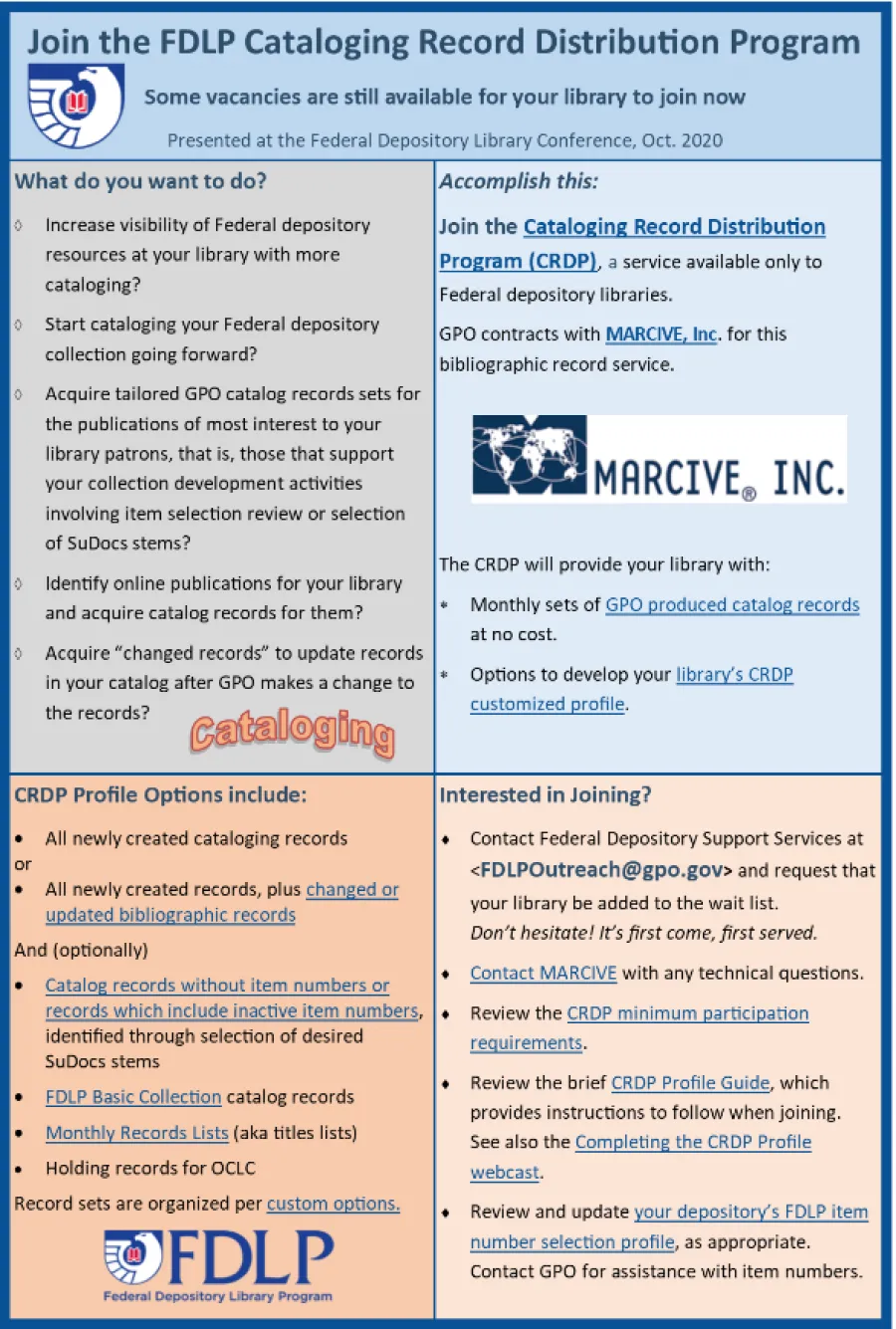
Join the Cataloging Record Distribution Program
Kathy Bayer, Government Publishing Office, Federal Depository Support Services, Outreach Librarian, [email protected]
This poster describes the FDLP’s Cataloging Record Distribution Program and invites additional depositories to join. The Cataloging Record Distribution Program (CRDP) provides a monthly set of GPO produced catalog records to participating Federal depository libraries at no cost to the libraries. Each participating library may acquire all newly created catalog records, or the new records plus changed records, with item numbers that match their item number selection profile.
Download a PDF of the poster.
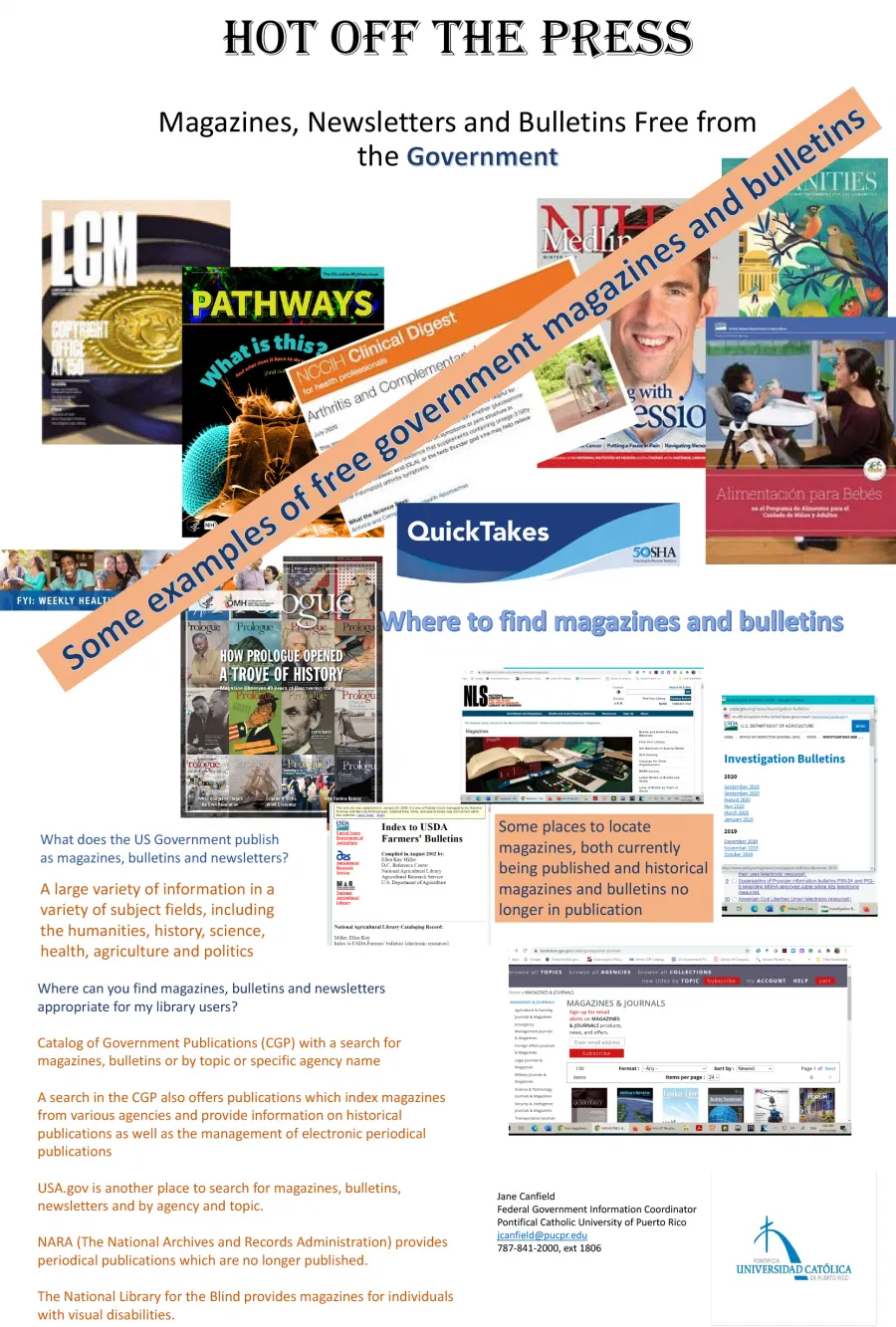
Hot off the Press: Magazines, Newsletters and Bulletins Free from the Government
Jane Canfield, Government Information Coordinator, Pontifical Catholic University of Puerto Rico, Encarnación Valdés Library, [email protected]
From health to history, the US Government offers a wide variety of magazines, newsletters, and bulletins free of cost. Most are in digital format and are offered by numerous agencies. This poster will highlight some of the magazines, where to subscribe and how to get the word out to your patrons.
Download a PDF of the poster.
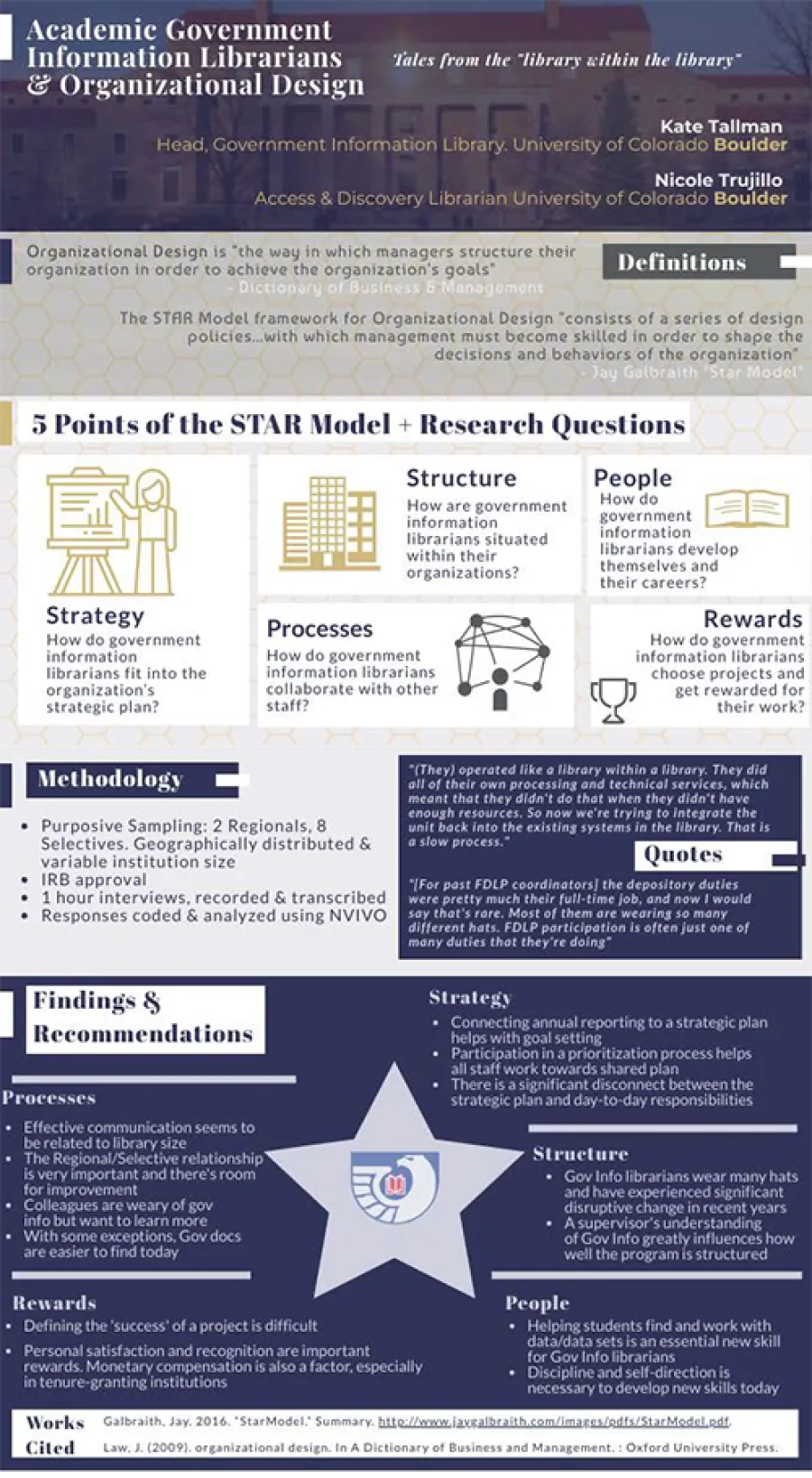
Academic Government Information Librarians and Organizational Design: Tales from the “Library within a Library”
Kate Tallman, Head, Government Information Library, University of Colorado-Boulder, Norlin Library, [email protected]
This study seeks to understand how an academic libraries’ organizational design might (or might not) support library employees. Researchers Kate Tallman and Nicole Trujillo interviewed academic Federal Depository Library Program coordinators with the goal of understanding how they perceive their role in the overall organization. Using the Galbraith STAR Model of Organizational Design to guide the discussion, participants were asked about their organization's strategy, structure, processes, people, and rewards.
Download a PDF of the poster.
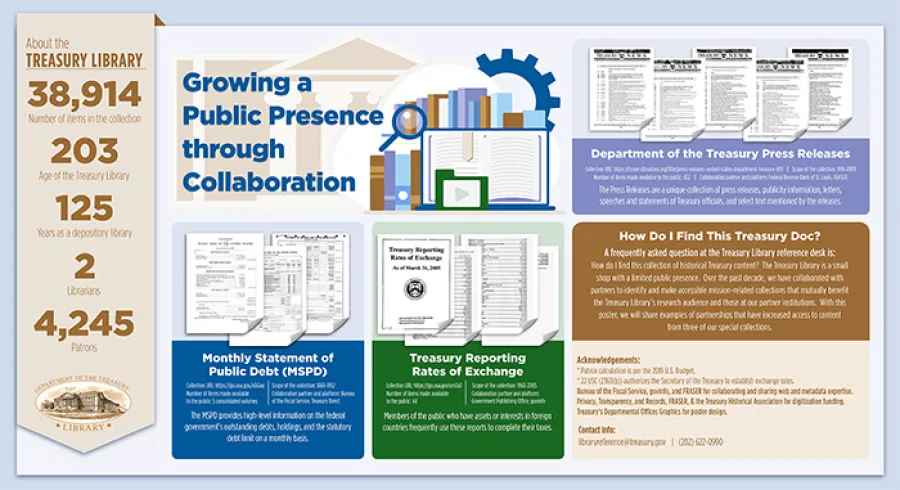
Growing a Public Presence through Collaboration
Kimberley Carter, United States Department of the Treasury, Treasury Library, Librarian, [email protected]
Andrew Young, United States Department of the Treasury, Treasury Library, Librarian, [email protected]
A frequently asked question at the Treasury Library reference desk is: How do I find this collection of historical Treasury content? The Treasury Library is a small shop with limited public presence. Over the past decade, we have collaborated with partners to identify and make accessible mission-related collections that mutually benefit the Treasury Library’s research audience and those at our partner institutions. With this poster, we will share examples of partnerships that have increased access to content from three of our special collections.
Download a PDF of the poster.
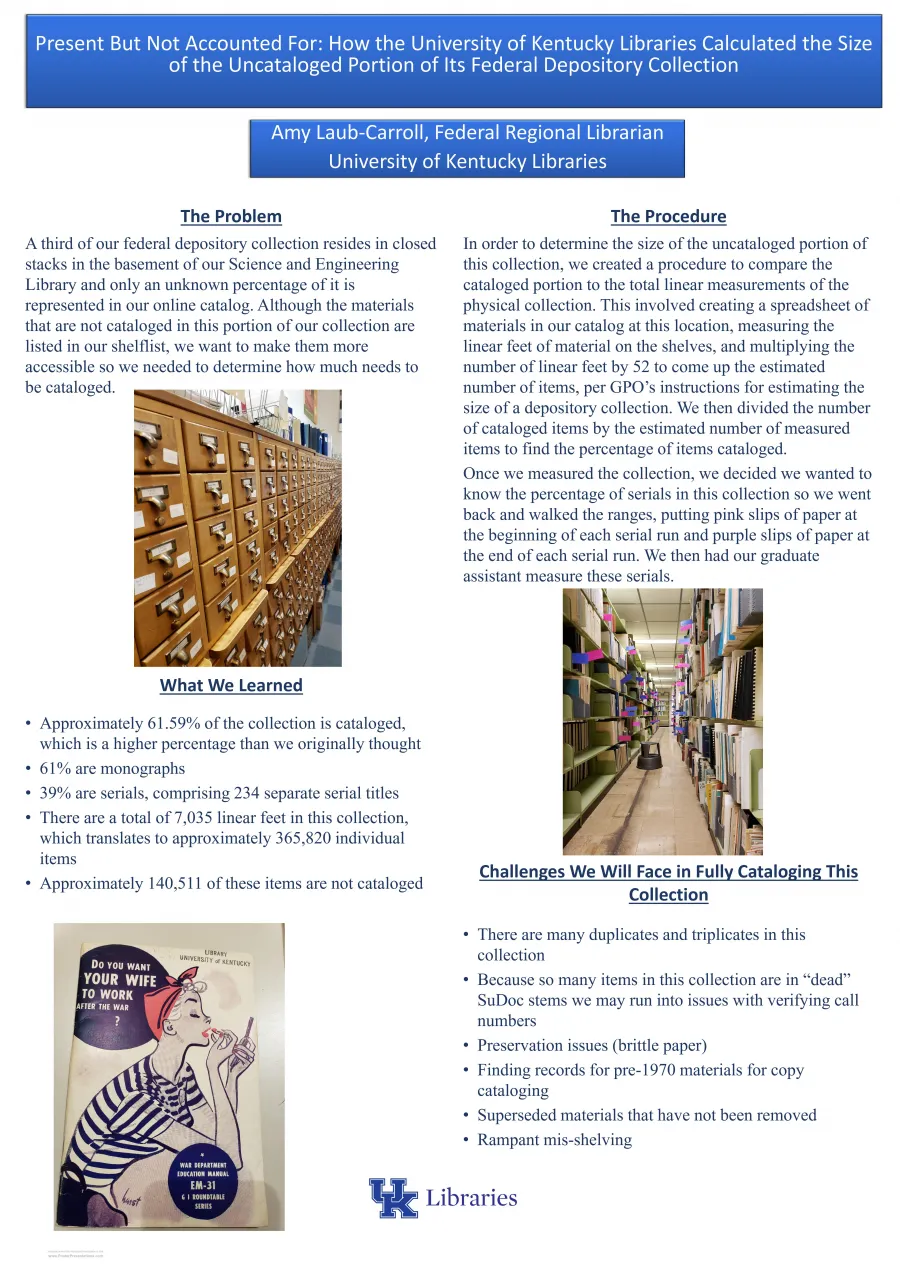
Present but Not Accounted For: How the University of Kentucky Libraries Calculated the Uncataloged Portion of its Federal Depository Collection
Amy Laub Carroll, University of Kentucky, William T. Young Library, Regional Depository Librarian, [email protected]
In 2019, the University of Kentucky Libraries wanted to find out the size of the uncataloged portion of its federal depository collection. The Regional Depository Librarian and her predecessor created a procedure to do this using a spreadsheet of items in their catalog and physical measurements of the collection. This poster session will describe the procedure, our process, what we learned, and challenges we foresee in cataloging this collection.
Download a PDF of the poster
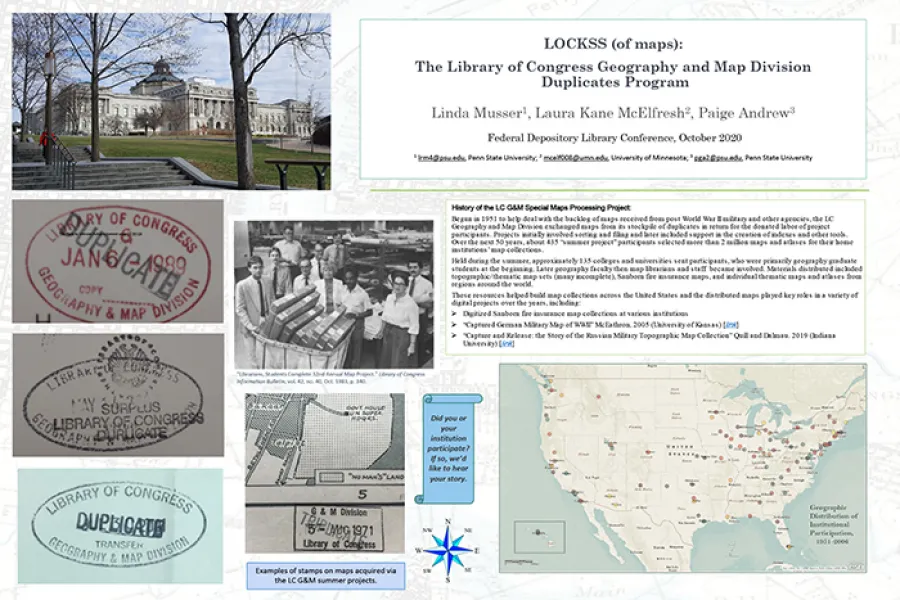
The Library of Congress Geography & Map Division Duplicates Program
Linda Musser, Penn State University, Fletcher L. Byrom Earth and Mineral Sciences Library, Distinguished Librarian and Library Head, [email protected]
Laura Kane McElfresh, University of Minnesota, [email protected]
Paige Andrew, Penn State University, [email protected]
For many libraries, the U.S. government has been a major source of maps. Primary receipts derive from the U.S. Geological Survey, the Census Bureau, the Forest Service, the National Park Service, and military sources such as the Defense Mapping Agency. Many libraries also benefited from duplicate maps received from the Library of Congress. From 1951 to the mid-2000s the LC Geography & Map Division held summer projects whereby institutions could apply to send staff to work at the Library of Congress for 4-12 weeks in exchange for selecting up to 1,000 maps or atlases per week. Works acquired in this manner can be distinguished by the identifying stamps, illustrated in this poster, and information about the program participants and history will be shared. More than 2 million maps and atlases were distributed to participating institutions over the course of LC G&M’s special map processing projects.
Download a PDF of the poster.
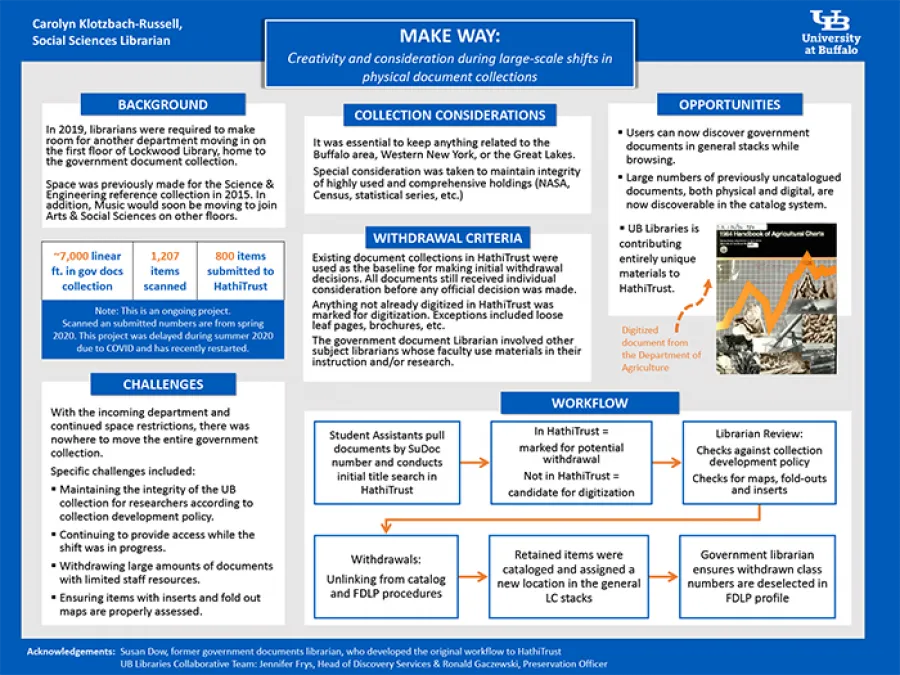
Make Way: creativity and consideration during large-scale shifts in physical document collections
Carolyn Klotzbach-Russell, University at Buffalo, Lockwood Library, Social Sciences & Government Information Librarian, [email protected]
In order to make space for additional departments moving into University at Buffalo’s Lockwood Library, the librarian in charge of Government Documents was required to move the collection out of its current location and integrate it into already overcrowded LC stacks. This meant reviewing, re-cataloging and weeding thousands of linear feet. In addition to shear volume, restrictions such as staff time and technology limited progress on the project.
UB Librarians were committed to retaining the integrity of the collection while working within strict space parameters. It was essential that collections of documents with local, special or heavy interest were given the appropriate consideration. A collaborative team made up of the government document librarian, preservation staff, and head of cataloging established processes that allowed for systematic review and handling of the entire collection. What is now a flexible, streamlined process not only fulfills its initial purpose but has paved the way to further improvements on the promotion and access of government documents, both to UB patrons and the general public.
Download a PDF of the poster.
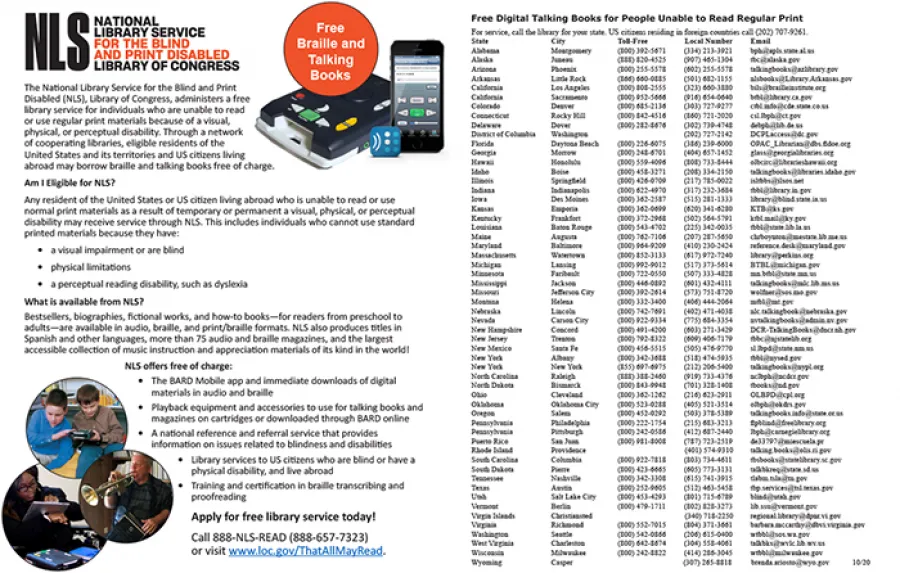
Free Braille and Talking Books for the Blind and Print Disabled
Gabrielle Barns, Library of Congress, National Library Service for the Blind and Print Disabled, Writer Editor, [email protected]
Learn more about the free library service for individuals who are unable to read or use regular print materials because of a visual or physical disability. Eligible residents of the United States and U.S. citizens living abroad may borrow and download braille and talking books free of charge. Over 300,000 titles – including bestsellers and classics, audio and braille magazines, and music instruction and appreciation materials – are available in audio, braille, and print/braille formats or for immediate download on the BARD Mobile app for iOS and Android smart devices.
Download a PDF of the poster.
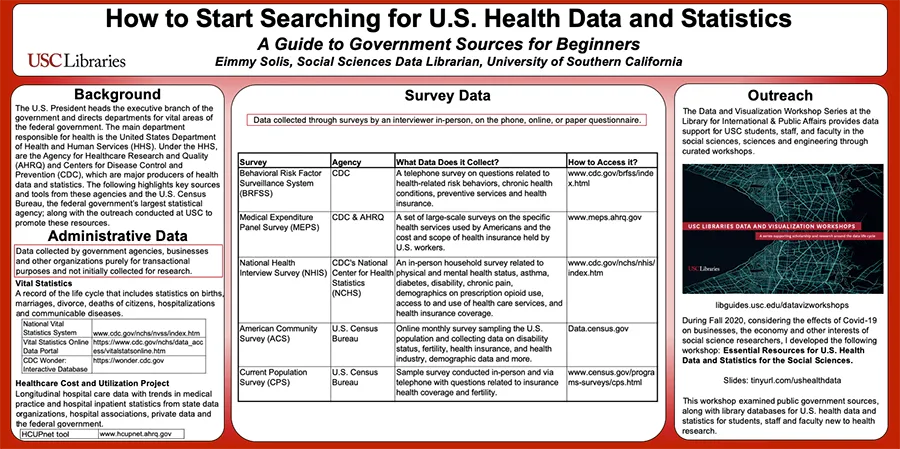
How to Start Searching for U.S. Health Data and Statistics: A Guide to Government Sources for Beginners.
Eimmy Solis, University of Southern California, Library for International & Public Affairs, Social Sciences Data Librarian, [email protected]
This poster will examine public resources for U.S. health data and statistics from the U.S. Census Bureau and agencies under the Department of Health and Human Services (HHS). Health data and statistics are important to advance our knowledge of COVID-19, but also to recognize the effects of a pandemic on businesses, the economy and other services. Participants will learn about the organizational structure of the HHS and discover the main health data producers to assist researchers in utilizing government health data for their research in the social sciences. Lastly, participants will learn about the strategies used at the University of Southern California Libraries to promote these health data sources to students, staff and faculty.
Download a PDF of the poster.
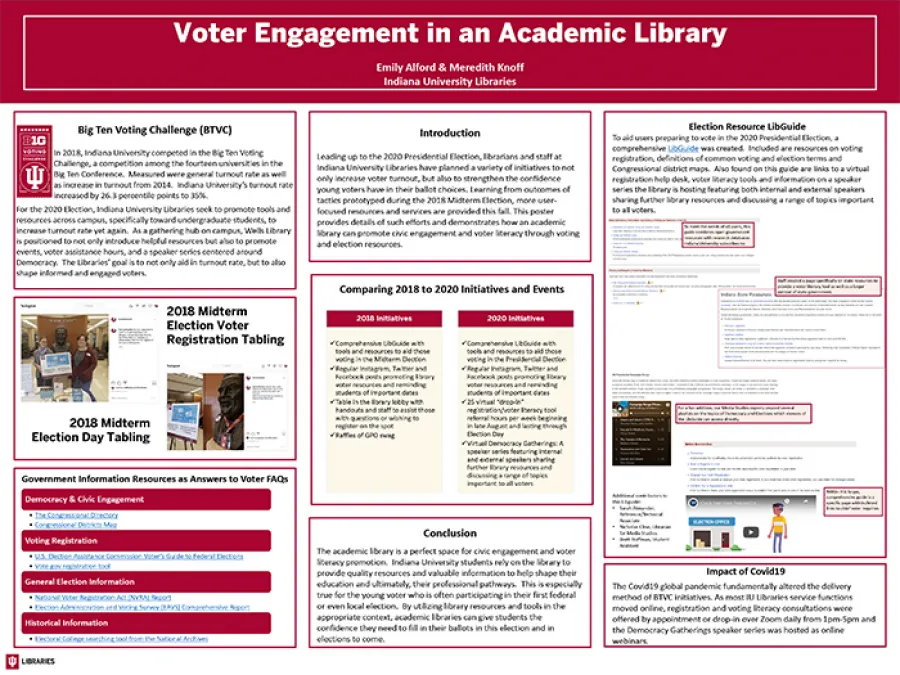
Voter Engagement in an Academic Library
Meredith Knoff and Emily Alford, Indiana University, Herman B. Wells Library, [email protected]
Leading up to the 2020 Presidential Election, librarians and staff at Indiana University Libraries have planned a variety of initiatives to not only increase voter turnout, but also to strengthen the confidence young voters have in their ballot choices. Learning from outcomes of tactics prototyped during the 2018 Midterm Election, more user-focused resources and services are provided this fall. This poster presentation will provide details of such efforts and demonstrate how an academic library can promote civic engagement and voter literacy through voting and election resources.
Download a PDF of the poster.
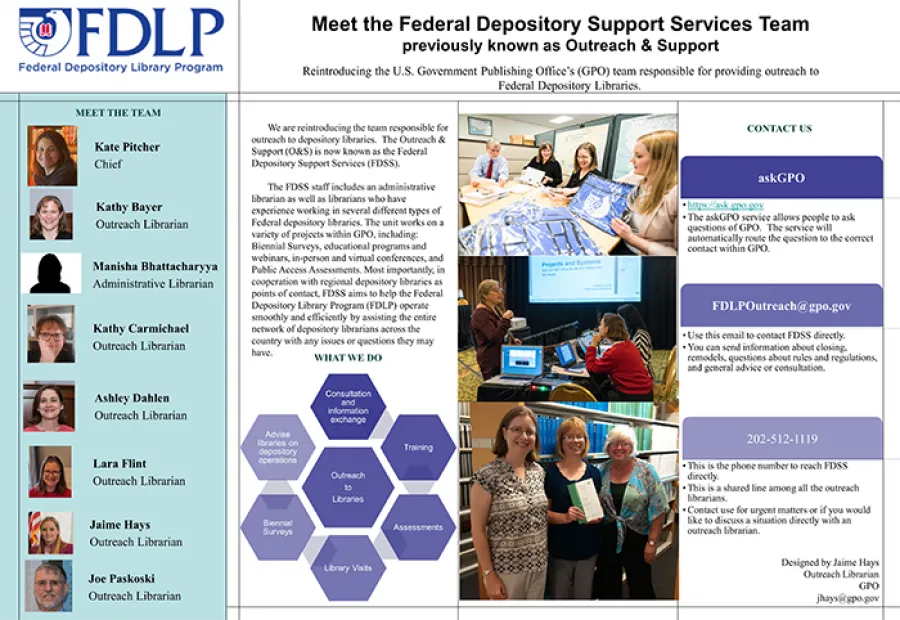
Meet the Federal Depository Support Services (FDSS) Team!
aime Hays, Government Publishing Office, Federal Depository Support Services, Outreach Librarian, [email protected]
This poster will reintroduce the old Outreach & Support (O&S) unit as the new FDSS unit. We will also introduce our new Chief. It will discuss our duties and how to get a hold of us.
Download a PDF of the poster.
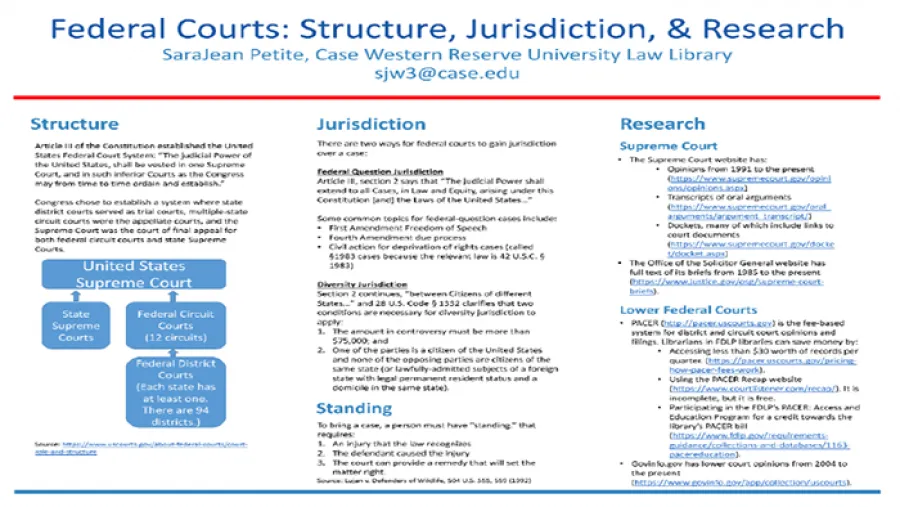
Federal Courts: Structure, Jurisdiction, & Research
SaraJean Petite, Case Western Reserve University, CWRU Law Library, Reference Government Documents Librarian, [email protected]
Information about the structure and jurisdiction of the United States Federal Court System, and how to obtain documents pertaining to cases in U.S. Federal Courts.
Download a PDF of the poster.
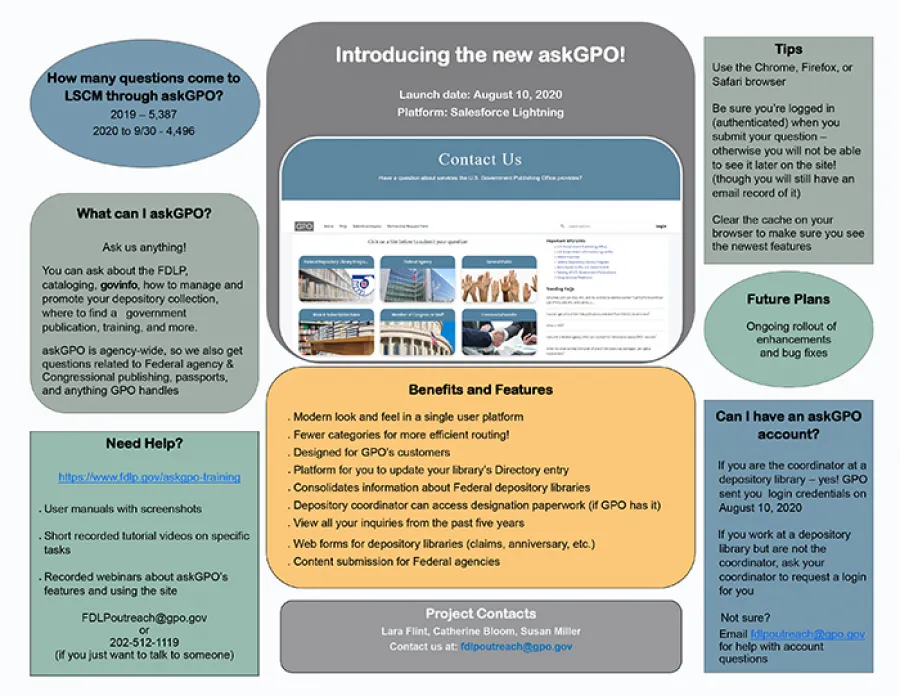
The New askGPO
Lara Flint, Government Publishing Office, Federal Depository Support Services, Outreach Librarian, [email protected]
GPO launched a new askGPO website on August 10, 2020. This poster highlights features of the site, where to get training, and how to use askGPO to get in touch and get your depository or other GPO-related questions answered.
Download a PDF of the poster.
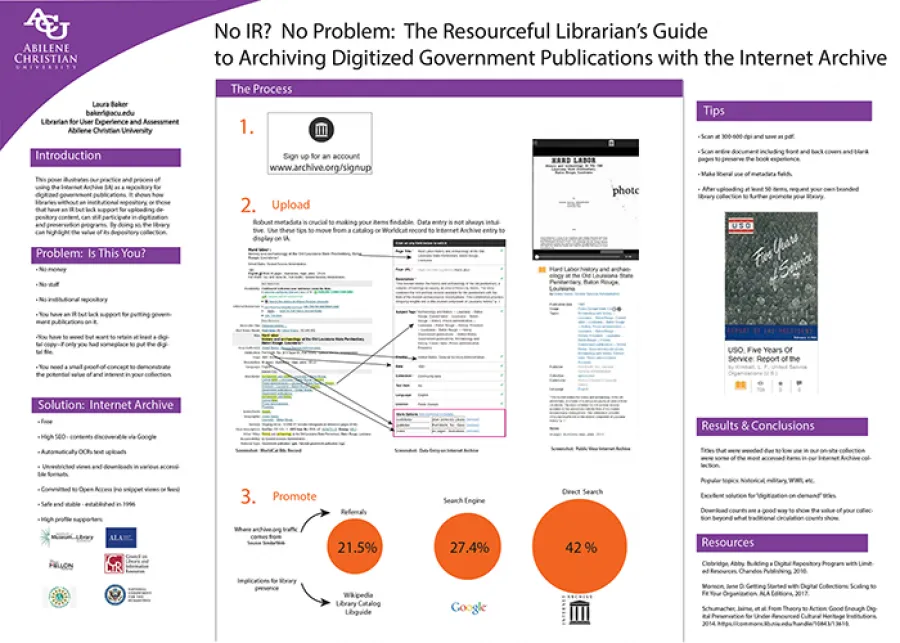
No IR? No Problem: The Resourceful Librarian's Guide to Archiving Digitized Government Publications with the Internet Archive
Laura Baker, Abilene Christian University, ACU Library, User Experience and Assessment Librarian, [email protected]
This poster illustrates our practice and process of using the Internet Archive as a repository for digitized government publications. It shows how libraries without an institutional repository, or those that have an IR but who lack support for uploading depository content, can still participate in digitization and preservation programs. By doing so, the library can highlight the value of its depository collection by showing how it is useful to others.
Download a PDF of the poster.
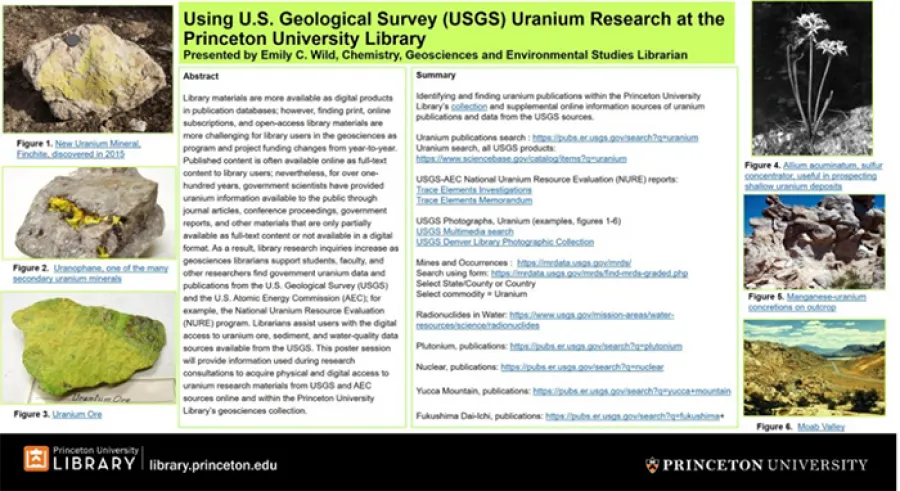
Using U.S. Geological Survey (USGS) Uranium Research at the Princeton University Library
Emily C. Wild, Princeton University, Princeton University Library, Chemistry, Geosciences and Environmental Studies Librarian, [email protected]
Library materials are more available as digital products in publication databases; however, finding print, online subscriptions, and open-access library materials are more challenging for library users in the geosciences as program and project funding changes from year-to-year. Published content is often available online as full-text content to library users; nevertheless, for over the one-hundred years, government scientists have provided uranium information available to the public through journal articles, conference proceedings, government reports, and other materials that are only partially available as full-text content or not available in a digital format. As a result, library research inquiries increase as geosciences librarians support students, faculty, and other researchers find government uranium data and publications from the U.S. Geological Survey (USGS) and the U.S. Atomic Energy Commission (AEC); for example, the National Uranium Resource Evaluation (NURE) program. Librarians assist users with the digital access to uranium ore, sediment, and water-quality data sources available from the USGS. This poster session will provide information used during research consultations to acquire physical and digital access to uranium research materials from USGS and AEC sources online and within the Princeton University Library’s geosciences collection.
Download a PDF of the poster.
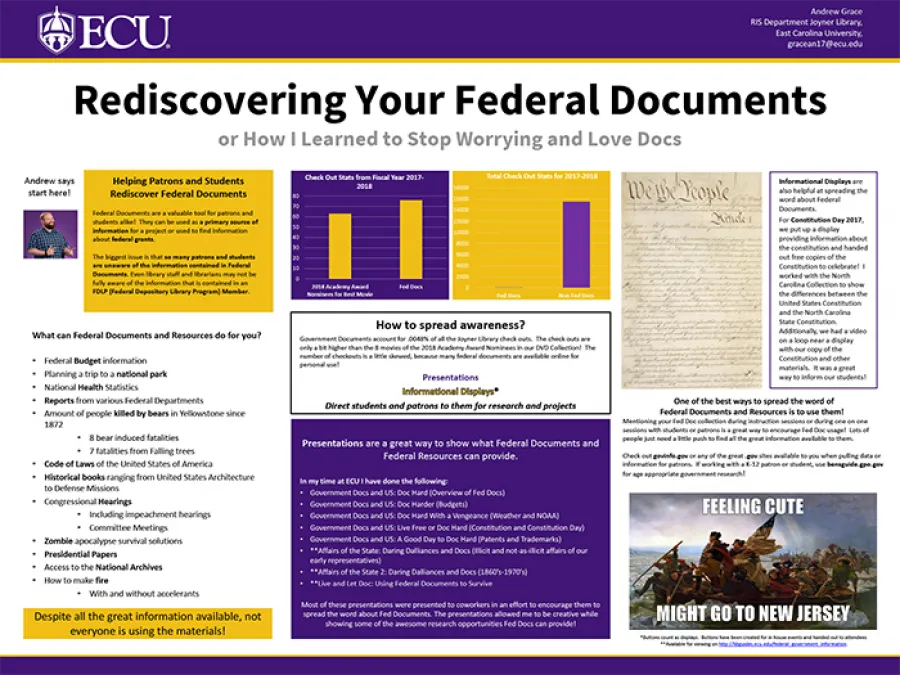
Rediscovering Your Federal Documents
Andrew Grace, East Carolina University, J.Y. Joyner Library, Federal Documents and Microforms Manager, [email protected]
While not all libraries contain Federal documents, Federal documents are everywhere and they are available for anyone and everyone to use! Often an underutilized resource, join the presenter to find out different ways that libraries can make Federal Documents and Federal Resources more interesting for your patrons to use!
Download a PDF of the poster.
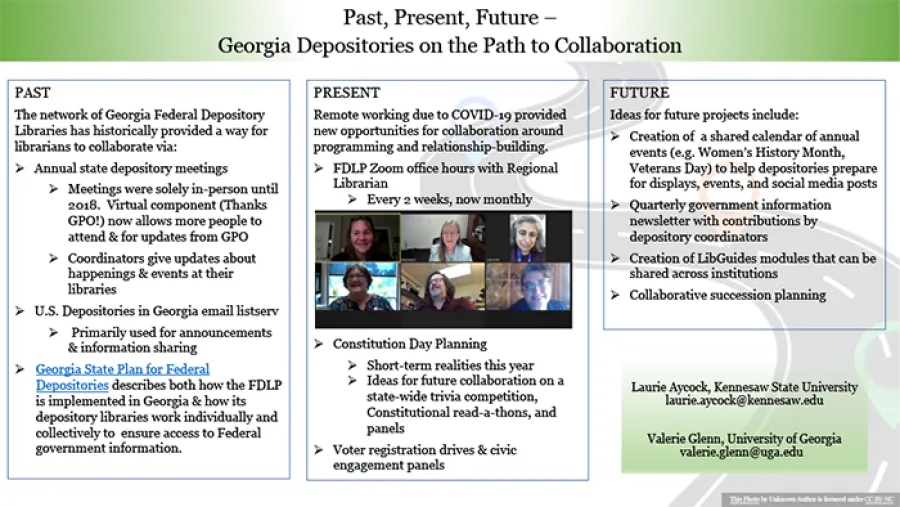
Past, Present, Future - Georgia Depositories on the Path to Collaboration
Laurie Aycock, Kennesaw State University, Horace W. Sturgis Library, Government Information Librarian, [email protected]
Valerie Glenn, University of Georgia, Map and Government Information Library, Head, Map and Government Information Library and Federal Regional Depository Librarian, [email protected]
The network of Georgia Federal Depository Libraries has historically provided a way for librarians to collaborate on collection-building, and remote working due to COVID-19 provided new opportunities for collaboration around programming and relationship-building. This poster will outline prior methods of collaboration, highlight how COVID-19 introduced new opportunities, and present some ideas for future outcomes.
Download a PDF of the poster.
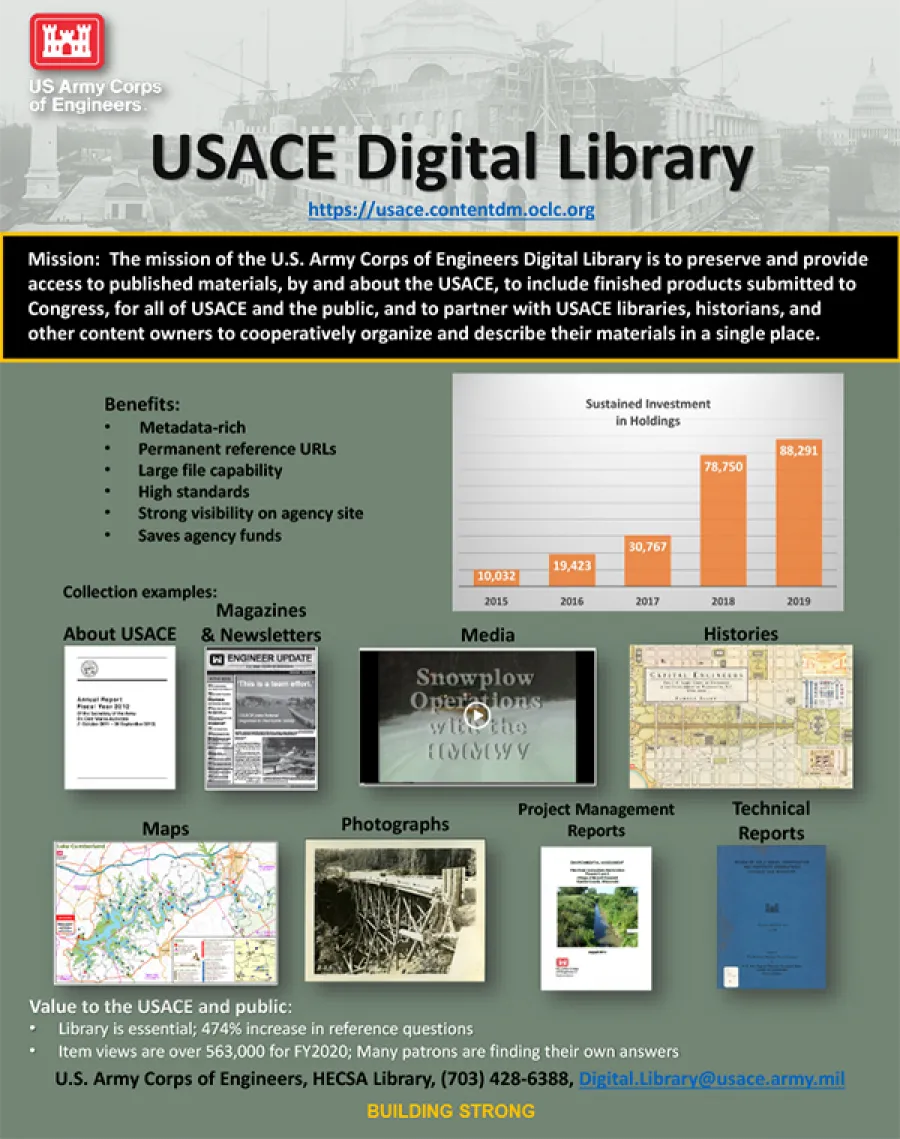
USACE Digital Library
U.S. Army Corps of Engineers, HECSA Library, [email protected]
An at-a-glance description of the USACE Digital Library. Learn about the mission, benefits, holdings, and value the digital library provides to the agency and the public. Explore content from its various collections.
Download a PDF of the poster.
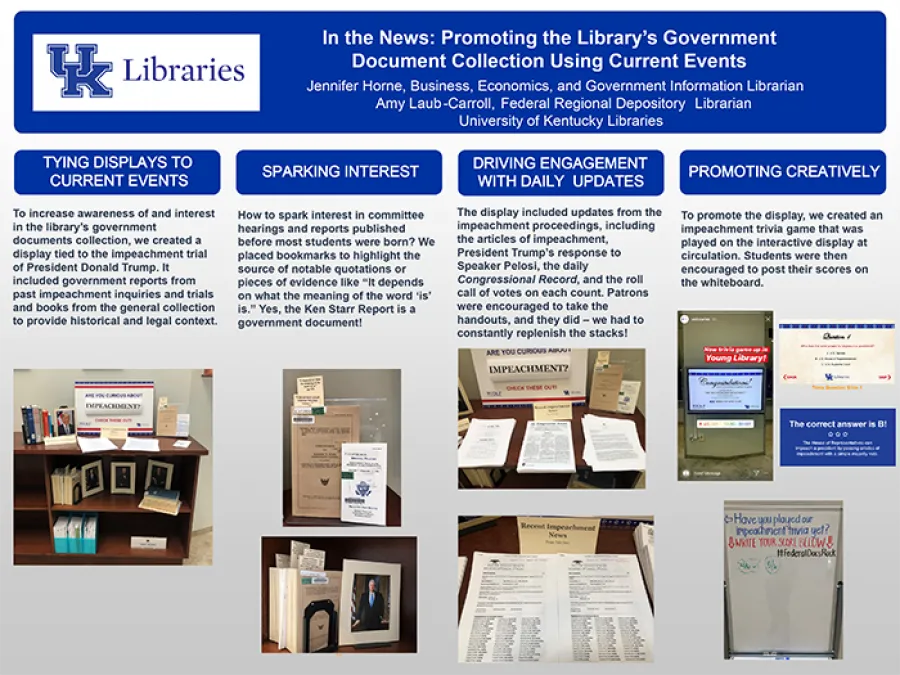
In the News: Promoting the Library’s Government Documents Collection Using Current Events
Jennifer Horne, University of Kentucky, William T. Young Library, [email protected]
To increase awareness of and interest in the library’s government documents collection, librarians at the University of Kentucky created a display tied to the impeachment trial of President Donald Trump. This display included government reports from past impeachment inquiries and trials, including congressional reports, committee referrals, and witness testimony. We placed bookmarks to highlight the source of quotations familiar to many, such as “It depends on what the meaning of the word ‘is’ is” and “I did not have sexual relations with that woman…” The display also included books from the general collection to provide historical context. Each day, we added the most recent impeachment news, with printouts of the articles of impeachment, the daily Congressional Record, and the final votes for each count. Patrons were encouraged to take these handouts. Library patrons were so engaged with the display, we often had to print additional handouts.
The display was supplemented with trivia questions on impeachment displayed on the monitors in front of the circulation desk. Patrons who took the five-question quiz could then report their scores on a whiteboard where questions are routinely posted.
Download a PDF of the poster.
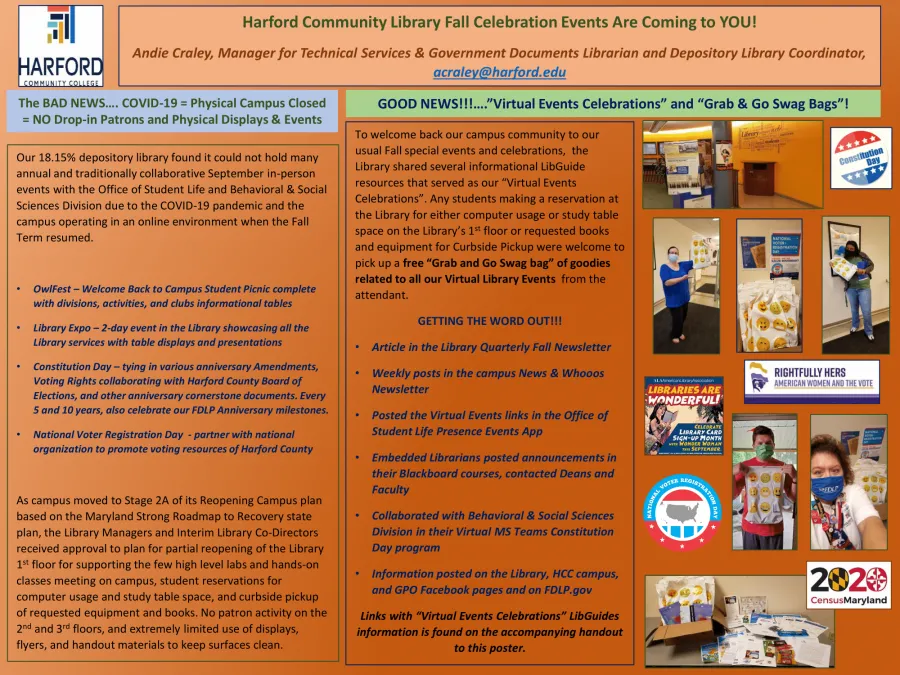
HCC Library Fall Celebration Events Are Coming to YOU!
Andie Craley, Harford Community College, Harford Community College Library, Manager for Technical Services & Government Documents Librarian, [email protected]
Harford Community College Library, an 18.15% depository library, found it wouldn’t be able to hold its many in-person events during September like OwlFest, Library Expo, Constitution Day, and National Voter Registration Day when the Fall term resumed due to the COVID-19 pandemic and the campus operating in an online environment. As the campus moved to Stage 2A of its Reopening Campus plan based on the Maryland Strong Roadmap to Recovery state plan, the Library managers and interim library co-directors received approval for a plan for partial reopening of just the 1st floor of the Library for supporting the few high level labs and hands-on classes meeting on campus, student reservations for computer usage and study table space, and curbside pickup of requested needed equipment and books. No patron activity on the 2nd and 3rd floors, and extremely limited use of displays and flyers and handout materials to keep surfaces clean.
Able to display the “Rightfully Hers” pop-up exhibit from the National Archives and an accompanying Wonder Woman poster from ALA with September as Library Card Signup Month along with small Constitution Day and National Voter Registration Day posters on the 1st floor, HCC Library marketed use of accompanying “Virtual Exhibits Celebrations” to these physical displays in the way of many subject LibGuides to share informational resources to online students and faculty through the Library Quarterly Newsletter, the campus News & Whooos weekly newsletter, the Office of Student Life Events Presence app, embedded librarians posting messages in Blackboard courses, sending messages out to Deans for their faculty to share with students, and in the HCC Library and the overall campus social media posts. News of HCC Library’s outreach efforts were picked up by GPO on both the U.S. Government Publishing Office Facebook page and on FDLP.gov.
To highlight the fun, all the outreach showcased that any students who made reservations at the Library for either computer usage or study table space on the 1st floor or stopped for curbside pickup of requested equipment and books during the Fall term were welcome to pick up a free “Grab and Go Swag Bags” - goodie bags that contained all kinds of informational handouts, flyers, bookmarks, stickers, Constitution Day buttons, govinfo.gov post-it notes, NPS maps, etc., all related for any of the Virtual Events held:
- 100th anniversary of passage of the 19th Amendment of Women’s Right to Vote
- 57th Anniversary of Martin Luther King, Jr.’s March on Washington for Jobs and Freedom
- Constitution Day September 17th
- National Voter Registration Day September 22nd
- Census 2020
- ALA September Library Card Signup Month
Download a PDF of the poster.
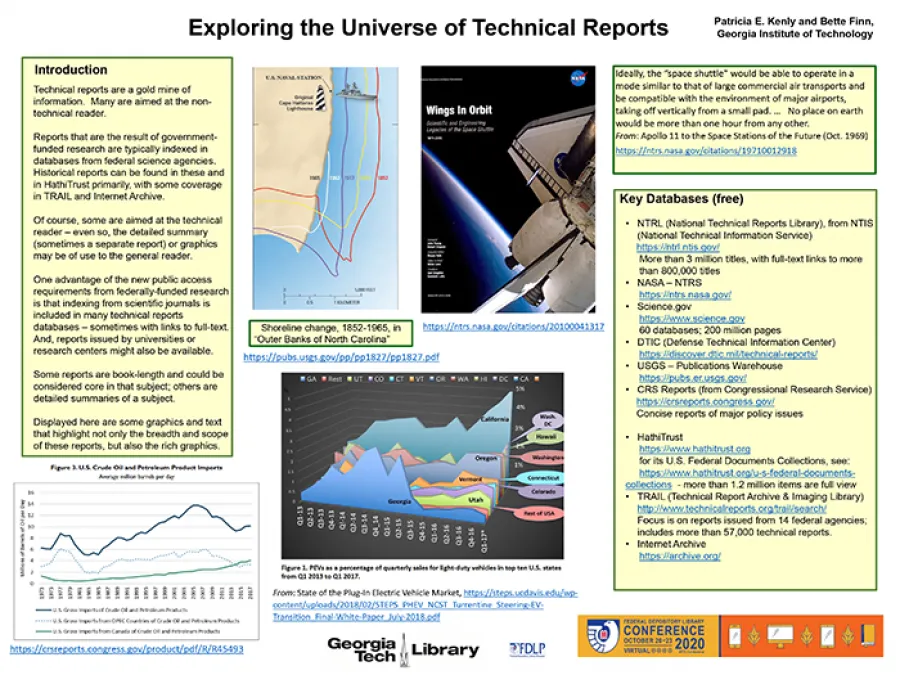
Exploring the Universe of Technical Reports
Patricia E. Kenly, Georgia Institute of Technology, Georgia Tech Library, Business Reference Librarian and Government Documents Coordinator, [email protected]
Bette Finn, Georgia Institute of Technology, Georgia Tech Library, Electrical & Computer Engineering and GTRI Librarian, [email protected]
Technical reports offer in-depth coverage of the results of scientific, technical, engineering, and business research – the work of government agencies’ in-house experts as well as consultants. And, they can include analysis, recommendations, and a detailed executive summary - of a timely issue, emerging topic, or critical problem. High school and college students can find the reports useful because complex concepts are clearly explained. They also appeal to other general readers because of the practical approach to a topic. Free access is available to many of the reports in databases from federal agencies.
Download a PDF of the poster.
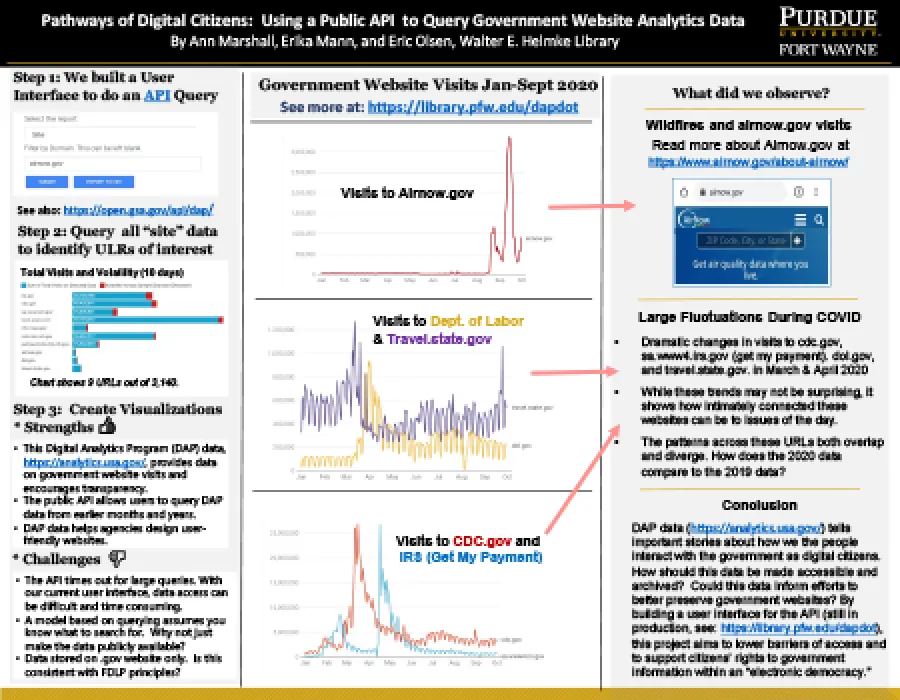
The Pathways of Digital Citizens: Using a Public API to Query Government Website Analytics Data
Eric Olsen, Purdue University Fort Wayne, Walter E. Helmke Library, Computer Science Graduate Student and Student Worker
The U.S. Federal Government’s Digital Analytics Program (DAP), at https://analytics.usa.gov/, offers real-time data and visualizations on how the public interacts with U.S. Government websites. This data has the potential to provide a captivating picture of digital citizenship and the ways in which people interact, on a daily basis, with the U.S. government on a vast range of issues from natural disasters to accessing your federal tax return and visiting Whitehouse.gov. DAP also makes the data publicly available through an API (Application Programming Interface). However, API functionality requires some technical expertise, making the data difficult to access for many users. This poster reports on Purdue University Fort Wayne Library’s efforts on two related projects: 1) to build a user interface to the DAP data in order to lower the barriers of access to the data, and 2) to create visualizations of government website use over time based upon this website analytics data. This project is a collaboration between a FDLP government information librarian, a computer science graduate student, and a digital humanities librarian where we also explore issues surrounding access and preservation of government websites, as raised through the DAP data. Finally, the project considers the importance of intermediaries who provide the digital infrastructures needed to facilitate access to researchers and the general public.
Download a PDF of the poster.
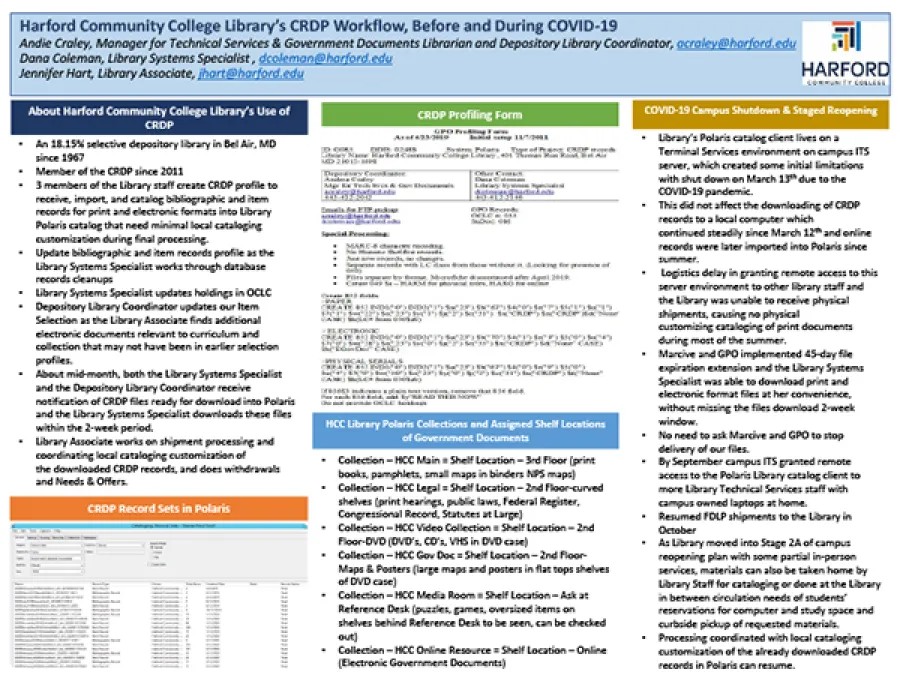
Harford Community College Library’s CRDP Workflow, Before and During COVID-19
Andie Craley, Harford Community College, Harford Community College Library, Manager for Technical Services & Government Documents Librarian, [email protected]
Harford Community College Library, an 18.15% selective depository library, has been a member of the Cataloging Record Distribution Program (CRDP) since 2011. Three members of the Library staff who coordinated content for this poster work together to create our CRDP profile to receive, import, and catalog bibliographic and item records for print and electronic formats into our Polaris catalog that need minimal cataloging customization during final processing. Suggestions are made to update our bibliographic and item records profile as the Library Systems Specialist works through database records cleanups, and to update our item selections as the Library Associate finds additional electronic documents relevant to our curriculum and collection that may not have been in an earlier selection profile. About mid-month, both the Library Systems Specialist and the Manager for Technical Services receive notification of CRDP files ready for download into Polaris and the Library Systems Specialist downloads these files within the 2-week period. The Library Associate, whose duties include both Circulation Desk duties and hours in Technical Services, works on shipment processing with coordinating cataloging customization of the downloaded CRDP records, and also does withdrawals and Needs & Offers.
Our Polaris catalog client lives on a Terminal Services environment on our campus ITS server, which created some initial limitations when HCC Library shut down on March 13, 2020 due to the COVID-19 pandemic. This did not affect the downloading of our CRDP records to a local computer which continued steadily since March 12th and online records were later imported into Polaris since the summer. For a certain time there was a delay in granting remote access to this server environment to other library staff and the Library was unable to receive physical shipments, so there was no physical customizing cataloging of print documents during most of the summer. When Marcive and GPO implemented the 45-day file expiration extension during COVID-19 pandemic library closure, the Library Systems Specialist was able to download both the print and electronic format files at her convenience, without having to worry about missing the files download 2-week window. There was no need to ask Marcive and GPO to stop delivery of our files. Eventually by September, ITS had granted remote access to the Library Polaris catalog client to more Library Technical Services staff with campus owned laptops at home. Eventually processing coordinated with cataloging customization of the already downloaded CRDP records in Polaris can begin again once we resume FDLP shipments as the Library has resumed some partial in person services, and materials can also be taken home by Library Staff for cataloging or at the Library in between circulation needs of students.
Download a PDF of the poster.
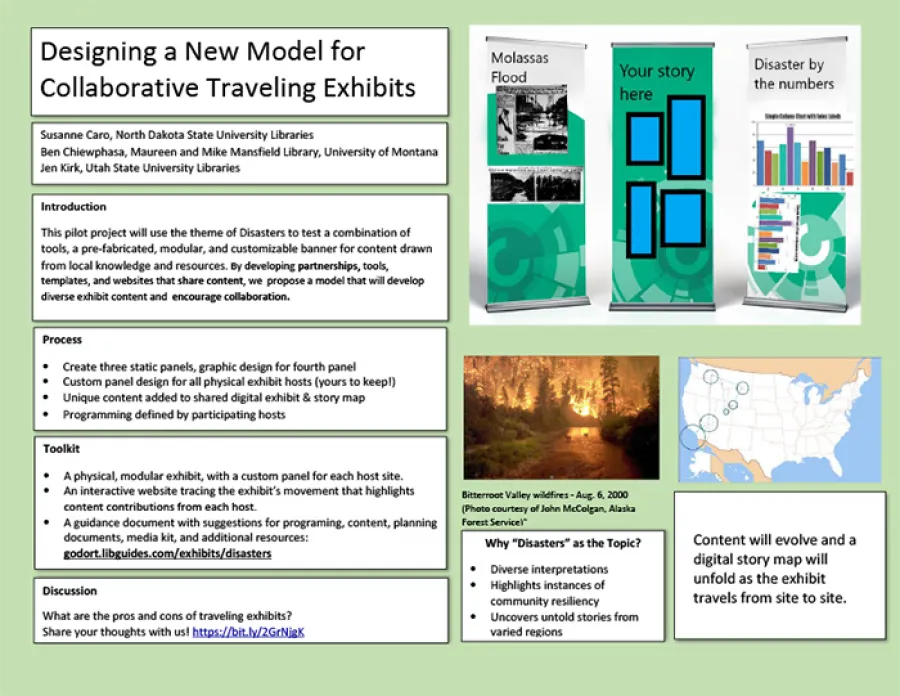
Designing a New Model for Collaborative Traveling Exhibits
Susanne Caro, North Dakota State University, Main Library, Government Information Librarian, [email protected]
Libraries use exhibits as tools for lifelong learning, highlighting collections, community outreach, and promoting diversity. However, exhibit development requires significant investment of time, expertise, and budgetary support unavailable at some institutions. Librarians from three institutions are designing a pilot project using the theme of disasters and community response as a framework for testing a combination of online exhibit space and a pre-fabricated, modular exhibit with customizable content drawn from local knowledge and resources.
Download a PDF of the poster.
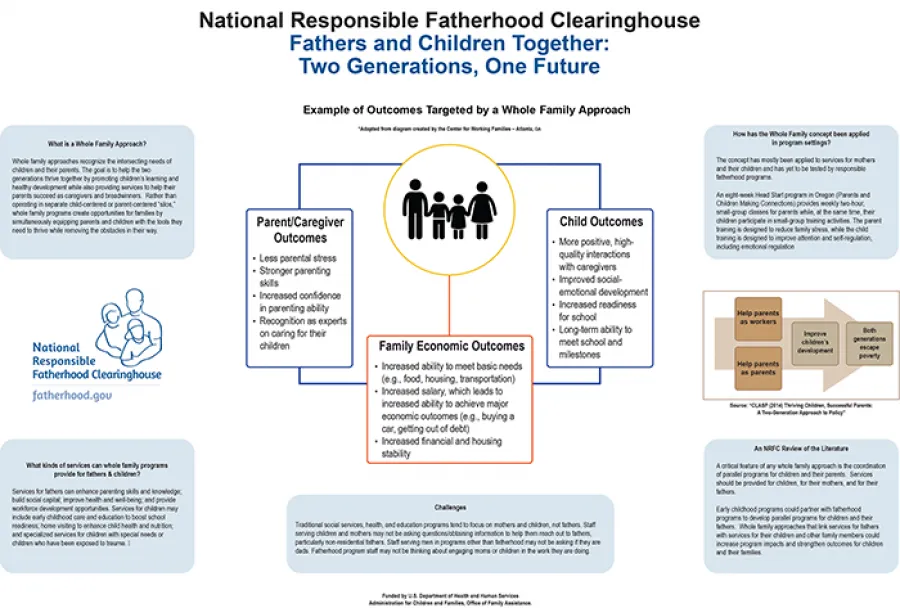
Fathers and Children Together: Two Generations, One Future
Rush Bishop, Conference Coordinator, National Responsible Fatherhood Clearinghouse, [email protected]
Whole family approaches recognize the intersecting needs of children and their parents. The goal is to help the two generations thrive together by promoting children’s learning and healthy development while also providing services to help their parents succeed as caregivers and breadwinners. Rather than operating in separate child-centered or parent-centered “silos,” whole family programs create opportunities for families by simultaneously equipping parents and children with the tools they need to thrive while removing the obstacles in their way.
Download a PDF of the poster.
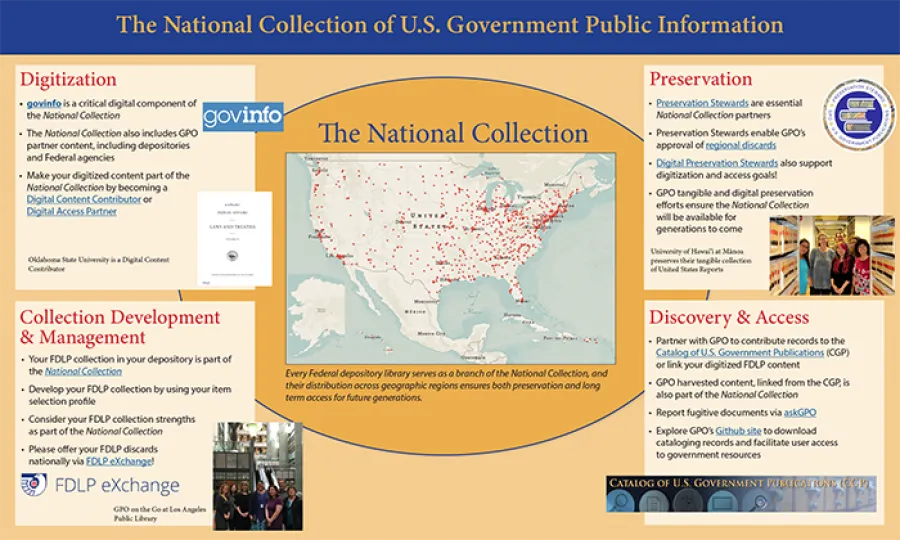
The National Collection of U.S. Government Public Information
Abby McDermott, Government Publishing Office, Library Technical Services, Collection Management Librarian, [email protected]
The National Collection of U.S. Government Public Information is a geographically dispersed collection of the corpus of Federal Government public information, accessible to the public at no cost. The development, maintenance, and preservation of the National Collection is critical to providing free, ready, and permanent public access to Federal Government information, now and for future generations. The scope of the National Collectionis all public information products of the U.S. Government, regardless of format or medium, produced by Federal employees or paid for with Federal funds. The network of Federal depository libraries serve as stewards for all of the materials distributed in tangible format throughout the history of the Federal Depository Library Program – our shared National Collection. GPO’s Cataloging & Indexing Program endeavors to develop a comprehensive national bibliography of U.S. Government public information, accessible through the Catalog of U.S. Government Publications (CGP). GPO curates a digital collection, including publications ingested in govinfo (GPO’s ISO 16363 certified Trustworthy Digital Repository), content harvested by GPO, and content hosted on Federal agency websites. This virtual conference poster highlights the ways in which all Federal depository libraries can serve the National Collection through collaboration at the regional and national level, and in coordination with GPO, especially through partnerships.
Download a PDF of the poster.
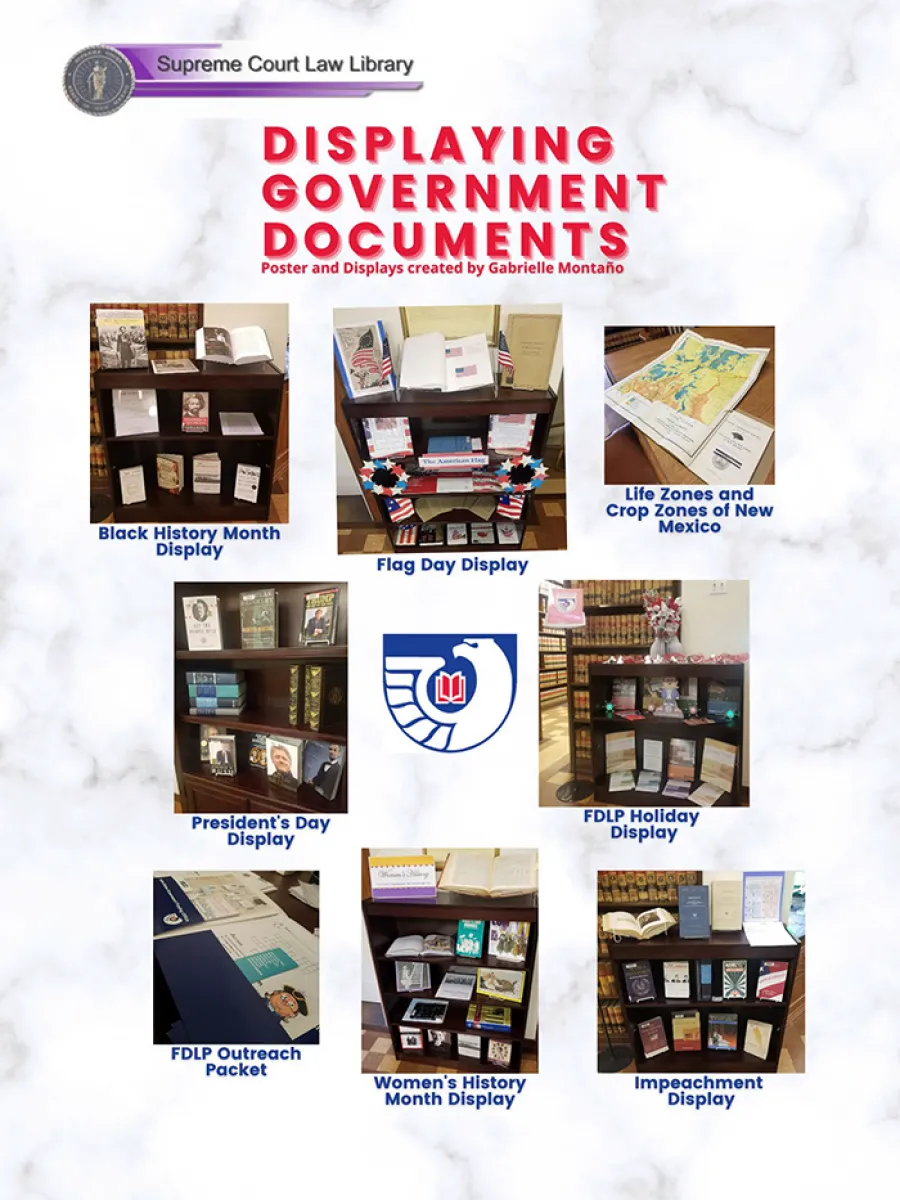
Displaying Government Documents
Gabrielle Montaño, Supreme Court Law Library, Law Librarian 1, [email protected]
The mission of the Supreme Court Law Library is to provide and produce legal information to our community in New Mexico. One way the law library does this is by participating in FDLP. Government documents add unique resources to the library’s collection.
Incorporating government documents into library displays highlights the primary resources cited in many legal treatises and lets everyone know they have access to the authoritative resources important to the Judicial community we serve.
Download a PDF of the poster.


